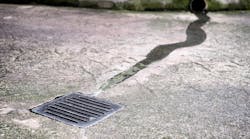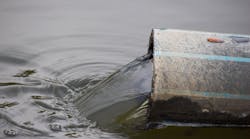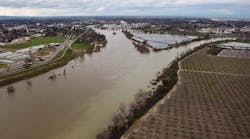KANSAS CITY, KS, May 18, 2010 -- The City of Kansas City, Mo., has agreed to make extensive improvements to its sewer systems, at a cost estimated to exceed $2.5 billion over 25 years, to eliminate unauthorized overflows of untreated raw sewage and to reduce pollution levels in urban stormwater, the Justice Department and U.S. Environmental Protection Agency announced today.
A consent decree lodged today in U.S. District Court for the Western District of Missouri, in Kansas City, Mo., requires the city to implement an Overflow Control Plan, which is the result of more than four years of public input. The plan is designed to yield significant long-term benefits to public health and the environment, and provide a model for the incorporation of green infrastructure and technology toward solving overflow issues.
When completed, the sanitary sewer system will have adequate infrastructure to capture and convey combined stormwater and sewage to the city's treatment plants. This will keep billions of gallons of untreated sewage from reaching surface waters.
"Today's agreement will have positive, lasting effects on both public health and the environment. The agreement prioritizes neighborhood sewer rehabilitation projects in the urban core, reducing basement and other sewer backups and thereby significantly improving public health," said Ignacia S. Moreno, Assistant Attorney General for the Justice Department's Environment and Natural Resources Division. "The Justice Department is committed to enforcing our nation's environmental laws so that the environment and the health of our communities are protected."
"This is a landmark day in the history of Kansas City, Mo.," said Karl Brooks, EPA Regional Administrator. "This agreement charts a course for the largest infrastructure project in the city's history, and what we believe to be one of the largest municipal green infrastructure projects undertaken anywhere in the nation."
"These provisions put one of the nation's largest municipal sewer systems on a steady path toward compliance with the Clean Water Act by committing it to correct deficiencies that have harmed the environment and posed risks to public health and safety for decades," Brooks said. "Over time, our area streams and rivers should become much cleaner and safer as a result."
Under the agreement, Kansas City will pay a civil penalty of $600,000 to the United States, in addition to the estimated $2.5 billion it will spend to repair, modify and rebuild its sewer system. The plan is also structured to encourage the city to use natural or engineered "green infrastructure," such as green roofs, rain gardens and permeable pavement, to minimize stormwater burdens on the improved system.
As part of the agreement, Kansas City will spend $1.6 million on a supplemental environmental project to implement a voluntary sewer connection and septic tank closure program for income-eligible residential property owners who elect to close their septic tanks and connect to the public sewer.
Kansas City, Missouri's, sewer system collects and receives domestic, commercial and industrial wastewater from a population of approximately 650,000 people in the city and 27 neighboring satellite communities, including a portion of Johnson County, Kan. The system covers more than 420 square miles, and includes seven wastewater treatment plants, 38 pumping stations and more than 2,800 miles of sewer lines, making it one of the nation's largest.
Of the 420 square miles covered by the system, 58 square miles mostly within the city's urban core are presently served by combined sewers, which carry both stormwater and wastewater, and the remainder of the system is served by separated sewers. Under the consent decree, Kansas City has agreed to expedite certain projects that are expected to provide more immediate relief to residences and other properties situated in under-served areas of the city.
Since 2002, Kansas City has experienced approximately 1,294 illegal sewer overflows, including at least 138 unpermitted combined sewer overflows, 390 sanitary sewer overflows, and 766 backups in buildings and private properties. The overflows are in violation of the federal Clean Water Act and the terms of the city's National Pollution Discharge Elimination System (NPDES) permits for operation of its sewer system.
Untreated sewage from overflows can cause serious water quality problems and health issues from pollutants including harmful bacteria, oxygen-depleting substances, suspended solids, toxic metals and chemicals, and nutrients. As part of today's settlement, the city has agreed to install disinfection treatment systems at all of its wastewater treatment plants by 2013.
Kansas City's overflows result in the annual discharge of an estimated 7 billion gallons of raw sewage into local streams and rivers, including the Missouri River, Fishing River, Blue River, Wilkerson Creek, Rocky Branch Creek, Todd Creek, Brush Creek, Penn Valley Lake, and their tributaries.
The settlement is subject to a 30-day public comment period and approval by the federal court. A copy of the consent decree is available on the Justice Department website at www.justice.gov/enrd/Consent_Decrees.html, and on the EPA Region 7 website at http://www.epa.gov/region07/enforcement_compliance/KCMO_consent_decree_cwa.htm
###


